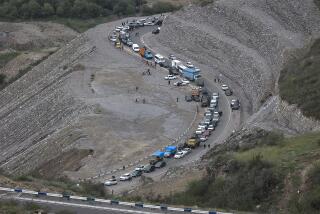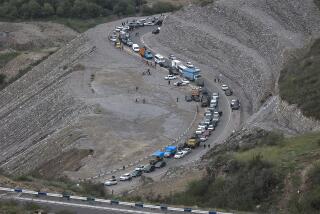Moscow Talks Produce Serb, Croat Accord
- Share via
MOSCOW — With violence threatening to escalate in Yugoslavia after a fourth republic, Bosnia-Herzegovina, decided to break out of the crumbling federation, the presidents of Serbia and Croatia agreed here Tuesday to order an immediate cease-fire among their supporters and to begin full peace talks within a month.
Brought face-to-face by Soviet President Mikhail S. Gorbachev, the Serbian and Croatian leaders agreed to negotiations to end simmering civil war and to reach a settlement based on full recognition of the sovereignty and equality of their two republics.
Serbian President Slobodan Milosevic said the statement was the start of a “fair and peaceful solution” to the Yugoslav crisis. Croatian President Franjo Tudjman praised Gorbachev for breaking the deadlock.
Both leaders asked that the Soviet Union, the United States and the European Community help organize negotiations. Gorbachev, smiling, committed the Soviets to continued mediation.
Their communique gave no date for the start of talks nor any specifics on what would be discussed. Tudjman and Milosevic already had met at The Hague under EC auspices.
However, this was the ninth cease-fire for Yugoslavia since fighting broke out after Croatia and Slovenia declared independence June 25, and prospects for its success were clouded by further violence Tuesday. There were rocket attacks on the Croatian towns of Vinkovci and Osijek and skirmishes around Sisak, Pakrac and Lipik. More than 1,000 lives have been lost in the fighting between federal army troops, Serbian irregulars and Croatian forces.
Besides Bosnia-Herzegovina, Croatia and Slovenia, the republic of Macedonia announced its independence on Sept. 8.
The decision by Bosnia’s Parliament early Tuesday was directed at Serbia and Croatia, warning them that they cannot settle their dispute by carving up Bosnia-Herzegovina, a mixture of Muslims, Serbs and Croats.
But the move also threatened to propel Bosnia-Herzegovina--whose capital Sarajevo was the site of the assassination that set off World War I--into the fighting. The army warned Bosnia-Herzegovina that its step toward independence could lead to civil war.
Radovan Karadzic, leader of Bosnia’s Serbian Democratic Party, accused the republic’s Muslims and Croats of leading it “into a hell in which the Muslim people will perhaps vanish.” But Bosnian President Alija Izetbegovic, a Muslim, said Karadzic’s comments show “why we don’t want to remain in present-day Yugoslavia.”
More to Read
Sign up for Essential California
The most important California stories and recommendations in your inbox every morning.
You may occasionally receive promotional content from the Los Angeles Times.












